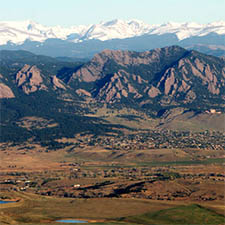Balancing Severe Decision Conflicts under Climate Extremes in Water Resource Management
Lisa Dilling
University of Colorado Environmental Studies, Center for Science and Technology Policy Research, and CIRES/WWA
Joseph Kasprzyk and Rebecca Smith
University of Colorado Department of Civil, Environmental and Architectural Engineering (CEAE)
Imtiaz Rangwala, Kristen Averyt, and Eric Gordon
CIRES/WWA
Laurna Kaatz
Denver Water
Leon Basdekas
Colorado Springs Utility
This project is funded by the NOAA Sectoral Applications Research Program
Over the past several years there have been increasing calls for decision support tools in the area of climate (e.g. NRC 2009a, NRC 2009b) and acknowledgement that changing extremes add to an already challenging decision environment for water managers (e.g. IPCC 2012). Recurring droughts, flood events, and concerns over extreme events in the future have created a strong interest among water managers in the Front Range of Colorado about how to plan in the face of these extremes (Lowrey et al. 2009, Woodbury et al. 2012). Traditional methods of identifying alternatives for water supply management may not fully capture the range of existing preferred alternatives, meaning that utilities may miss some of the solutions that appropriately balance among tradeoffs. In this project we seek to co-produce and test a newly developed multi-objective decision tool as a Testbed to aid this process, balancing conflicting management objectives for water planning under climate extremes and determining how policy alternatives perform under severe climate uncertainty. By combining innovative search algorithms, simulation models, and interactive visualizations, the proposed decision tool helps generate and evaluate new alternatives, as well as promotes managers’ learning about the tradeoffs and vulnerabilities of their systems.
General description: Our project team represents an interdisciplinary collaboration (policy, social science, engineering, operations research, climatology) between academics and water utility practitioners from 6 water providers in Colorado's Front Range. Water managers and researchers will work together from the start to define the problem formulation (policy levers, objectives and constraints) that will inform multi-objective evolutionary algorithms (MOEAs) and be combined with a representative water resources simulation model for a range of extreme climate scenarios. This Testbed approach will result in a visualization of the decision space that, we argue, may in fact expand the alternatives that still meet managers' decision criteria and allow managers to be able to visualize these more clearly than traditional tools. In our final step we will query managers about the tool, its results, and the process involved in incorporating such a tool into practice for helping to make decisions in anticipation of future extreme events. We will analyze these results and make some inferences about the viability of MOEAs and the larger issue of incorporating new tools into practice for urban water utilities.

